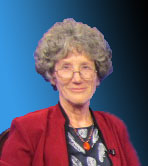Jeanne Dietsch | |
|---|---|
 | |
| Member of the New Hampshire Senate from the 9th district | |
| In office December 6, 2018 –December 2, 2020 | |
| Preceded by | Andy Sanborn |
| Succeeded by | Denise Ricciardi |
| Personal details | |
| Born | April 16,1952 Kenton,Ohio,U.S. |
| Party | Democratic |
| Spouse | Bill Kennedy |
| Children | 2 |
| Education | Western Michigan University (BS) |
Jeanne Dietsch (born April 16,1952) is an American politician and businesswoman who served as a Democratic member of the New Hampshire Senate, [1] representing the 9th district from 2018 to 2020. [2]